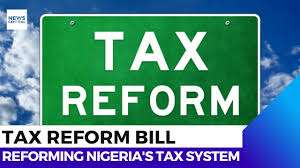Tax Reforms and Corruption in Nigeria: How Mismanagement Undermines Economic Growth

Story : written by Okafor Joseph September 22,2025
Across the world, the wealth of advanced nations has not come solely from natural resources but from effective taxation systems. Duties, levies, income tax, and customs formed the foundation of prosperity in Europe, Asia, and the Americas.
Nigeria, despite being richly endowed with oil, gas, and agricultural potential, continues to fall behind because its tax system is crippled by corruption, mismanagement, and lack of accountability. Taxation is not an obstacle to progress; it is the bedrock of national development. In thriving economies, citizens willingly pay taxes because they can see the results in infrastructure, healthcare, education, and security.
Even history records that Jesus of Nazareth, a humble teacher with no salary, still paid his taxes—highlighting that fulfilling civic responsibility is integral to society.
Tinubu’s Tax Reforms Raise Questions
President Bola Ahmed Tinubu’s administration recently introduced new tax reforms that have sparked nationwide debate. Under the policy, Nigerians earning less than ₦250,000 annually are exempt from income tax. While this appears compassionate, it underscores the depth of poverty in Nigeria, where a large majority of citizens earn below this threshold and thus cannot meaningfully contribute to state revenue.
In addition, the introduction of a 5% fuel tax and the mandatory use of Tax Identification Numbers (TIN) for opening savings accounts signal a broader attempt to expand the tax base and curb evasion. Yet the key question remains: will these reforms translate into better infrastructure and services, or will the funds disappear into corrupt pockets?
The Real Problem: Mismanagement, Not Taxation
Nigeria’s challenge is not the unwillingness of citizens to pay taxes but the failure of leaders to manage public funds responsibly. Roads remain impassable, hospitals lack essential equipment, and schools are collapsing—all despite billions in tax revenue.
A positive example exists closer to home: as Governor of Anambra State, Professor Charles Soludo demonstrated that tax revenue, when managed with transparency and accountability, can transform communities. Under his leadership, roads, bridges, and urban infrastructure flourished.
Unfortunately, at the national level, decades of poor governance—from military regimes to democratic governments—have turned the treasury into a source of personal enrichment. Unlike countries such as the United Arab Emirates, Malaysia, and Singapore, which have built strong economies through disciplined tax systems, Nigeria remains trapped in mismanagement despite its vast oil wealth.
Will 2026 Bring Real Change?
With new tax bills scheduled to take effect in January 2026, Nigerians are asking tough questions:
- Will these reforms finally end decades of wasteful governance?
- Will the treasury be shielded from corrupt politicians?
- Or will the reforms simply recycle failed policies under a new name?
Past attempts, such as the Single Treasury Account (TSA) introduced under President Muhammadu Buhari in 2016, promised to block leakages but largely failed to deliver on their revolutionary promise. Citizens worry the current reforms—including the fuel levy and TIN requirements—could once again benefit the political elite rather than ordinary people.
A Call for Transparency and Accountability
Taxation is not a punishment but a social contract. Citizens pay, and in return governments provide roads, schools, hospitals, water, and security. In developed countries, taxes fund everything from social welfare to advanced research. In Nigeria, however, citizens pay taxes but still build their own schools, drill boreholes, and hire private security.
If properly implemented, Tinubu’s reforms could mark a turning point for Nigeria’s economic development. But if mismanaged, they risk deepening public distrust and widening the gap between the government and its people.
Nigeria’s path forward depends on transparency, accountability, and visionary leadership. Only then will taxation serve as a true passport to national progress instead of a toll that enriches a corrupt few.






